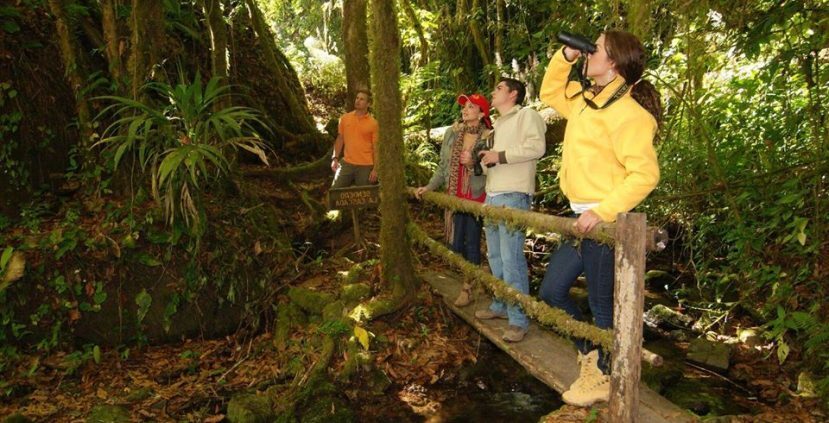
Devastating scenes of Polar icecaps irreversibly melting. Once paradisiacal beaches awash with a horrifying quantity of plastic. Local communities overrun by infrastructure built without a forethought to sustainability, and cultural traditions eradicated by the need to cater to foreign tourists. Nowadays, these consequences of global travel are all headlined more often than not on our TV or computer screens, making it impossible to ignore the deafening plea for each traveller to do his/her part for the environment and responsible tourism.

The Center for Responsible Travel (CREST) is pioneering the way for responsible tourism practices that businesses, destinations and travellers can adopt. These practices outline ways to achieve a healthier environment, help communities and honour indigenous cultures and ecosystems. Indeed, the Managing Director states their ultimate aim is to show travellers that the answer is “not to stay home” but to “travel in ways that are smarter” and that help “transform the way the world travels” in the future.
Founded in 2003 under the title the Center for Ecotourism and Sustainable Development, and later the Center for Responsible Travel, CREST, a non-profit organisation has always been focused on helping the world to a greener future. While trends of sustainable travel and ecotourism have started the necessary transition into creating this environmentally healthy future, CREST’s research found that destinations are nonetheless still suffering due to a lack of examination and scrutiny into the detailed workings of the tourism industry.

Understanding that tourism is the largest employer in the world, CREST started with the intention to counter the lack of information regarding the travel industry’s role in environmental impact. They do this by providing interdisciplinary analysis and innovative solutions through research, consultancies, documentary films, courses and field projects to combat overtourism and climate change, without destroying the travel boom.

With their core programs and plans concentrating on the most sustainable practices already in ecotourism, coastal and marine tourism, community-based tourism, and indigenous tourism, CREST’s key motivator is to ‘make tourism a force for good’. Their principle design for responsible tourism is to raise awareness on human ecology and the ways travellers need to adopt a more respectful, protective and helpful stance towards the natural, spiritual and cultural elements in a destination.

Indeed, believing that there’s a need to transform the tourism industry for the greater good goes hand-in-hand with the survival of tourism in general. CREST is devoted to aiding both by assisting governments, international agencies, and businesses to come up with policies and practises that allow for travel to have a more globally positive impact. Targeting these sectors is no coincidence. Instead, CREST believes that for responsible tourism to develop businesses and destinations play a vital role in fostering, raising awareness and educating their travellers about the development of the community and promoting conservation.

The solutions CREST provide range from sustainable tourism plans, development of travellers’ philanthropy initiatives, sustainable building plans and destination assessments. All of these work within their triple bottom line approach, meaning their projects all have positive environmental, socio/cultural and economic impacts. According to CREST, it is only with this triple focus that true sustainability can be achieved.

Showing their concern for overtourism, CREST set up a project titled ‘Overtourism: Seeking Solutions’. Here, CREST, in partnership with The George Washington University’s International Institute of Tourism Studies, hosted a 2018 World Tourism Day Forum. This forum was dedicated to finding solutions to overtourism in historic cities, national parks, protected areas, World Heritage Sites, coastal and regional destinations. This brought together over 200 contributors ranging from NGOs to members of the media, resulting in a new CREST definition of overtourism.

Indeed, CREST’s definition is only one of their approaches to responsible travel, but it demonstrates the lengths they’ll go to in order to make those in the travel industry understand the necessity for responsible tourism. Their definition states any tourism that has moved beyond the limits of acceptable change in a destination, for example, resulting in the degradation of the environment, diminishing of the traveller experience and negative impact on residents, should be avoided. A definition they suggest businesses and destinations should encourage their visitors to consider in order for the development of responsible tourism and protect the biodiversity.

Furthermore, CREST aims to have tourism in a position to always help local communities and indigenous peoples to thrive and in doing so eradicate rural poverty, providing economic opportunity. But their underlying purpose is to educate travellers on the benefits of all these methods in a way that engrains within them an ability to continue responsible tourism on their own, with the hope of changing the landscape of travel in the future.

One such project is CREST’s ‘Impact Tourism: Giving Time, Talent, & Treasure’. Here, CREST suggests that tourism businesses and travellers should spend time making physical, social and environmental contributions to local communities and peoples beyond the bare minimum that is generated through normal tourism businesses. Taking this one step further, CREST’s project prioritises that it’s not about collecting loose change for beggars or charities but about integrating businesses and visitors into supporting local communities. Ways in which CREST advocates this is by assisting local projects that promote social empowerment, education and entrepreneurship and long-term conservation. According to CREST, this in turn provides an enriching travel experience as travellers are partaking in meaningful, culturally sensitive and fruitful communications with host communities.

As their longest running programme, CREST has recently launched their ‘2020 Impact Tourism Handbook’ that expands on the principles found in the aforementioned project. This handbook provides five topical essays and 22 case studies from NGOs and destinations, including brands like Six Senses and World Wildlife Fund. It is organised into chapters titled Voluntourism, Corporate Sustainability & Social Impact and Independently Owned Accommodations & Tour Operators (to name a few), offering those interested in supporting responsible tourism to “do right”, over just “doing good”. Here, inspiration on how to make a more positive difference is guided by CREST’s previous challenges and the lessons they have learnt themselves.

It is no wonder then that CREST is receiving considerable support from the travel industry at large, with the likes of the aforementioned brands and Chris Blackwell, owner of Island Outpost, speaking out and championing their cause. Speaking to CREST on tourism, Chris states that he “believes in bridges rather than walls”, thinking “the best way to do that is to show that you care about the people. It is much better to put money into goodwill and work with our neighbours”. A statement charged with urgency, Chris and many others is furthering ideas on how CREST and tourism professionals can create sustainable tourism into a machine that runs on the notion of positive development. A development that always puts regional communities and climate change at the forefront, being the force that prevents – or teaches those in the industry and travellers – to prevent overtourism and the destruction of destinations. It won’t be surprising if before long every leader in the travel industry is speaking and acting on behalf of CREST’s responsible tourism principles.
Indeed, beyond pioneering for responsible travel to ensure healthy communities are the foundation of a healthy tourism industry, CREST has launched the Future of Tourism Coalition. In partnership with Destination Stewardship Center, Green Destinations, Sustainable Travel International, Tourism Cares, and The Travel Foundation with the guidance of the Global Sustainable Tourism Council, their mission is to position ‘destinations at the centre of travel recovery plans’. Unfettered travel has been diminishing authentic experiences, disrupted communities and historical sites, and damaged ecosystems. Now CREST has a chance to change the problem and move forward with a sustainable future and the coalition is calling on tourism agencies, travel companies, investors, governments, NGOs and destinations to commit to their guiding principles. These principles include and are not limited to, destination management, tourism developments based on the quality of experience over quantity of visitors, mitigating climate impact, and ensuring investments are bringing positive impacts for the environment and communities.

But it is not just tourism businesses, NGOs and destinations who play a part in healing the planet, travellers must also be involved. CREST advises any who travel to carefully design trips that prioritise enjoyment and reducing carbon footprints. In order to encourage this, CREST has a plethora of articles and website pages that offer guidance on how to holiday in locally owned hotels, buy local craft and eat in non-chain restaurants while having the option to learn more about building bridges with varying cultures and acting with environmental and social integrity.

Dedicated to forwarding responsible tourism, CREST is forging the way for a healthier tomorrow. Nothing, not even the Coronavirus pandemic, is stopping them from achieving their vision of the tourism industry as a force for good; one that preserves and protects the earth’s flora and fauna, authentic cultures and important historical sites, local communities and destinations. It is no wonder the creators of CREST are adamant that “responsible travel must be embraced by the entire travel industry. It is not an option, but an imperative”.
